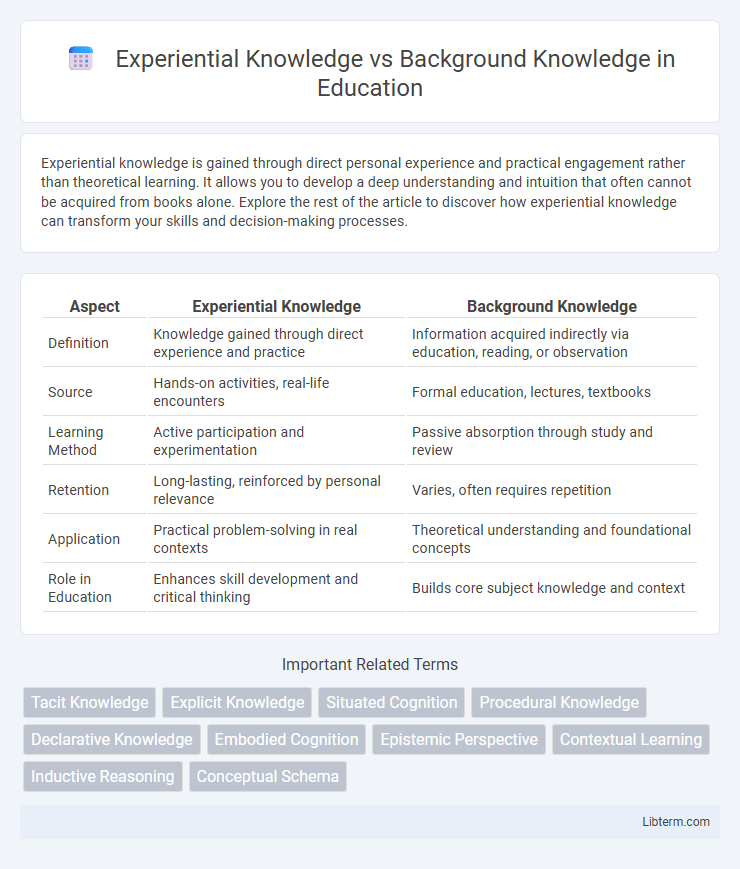Experiential knowledge is gained through direct personal experience and practical engagement rather than theoretical learning. It allows you to develop a deep understanding and intuition that often cannot be acquired from books alone. Explore the rest of the article to discover how experiential knowledge can transform your skills and decision-making processes.
Table of Comparison
| Aspect | Experiential Knowledge | Background Knowledge |
|---|---|---|
| Definition | Knowledge gained through direct experience and practice | Information acquired indirectly via education, reading, or observation |
| Source | Hands-on activities, real-life encounters | Formal education, lectures, textbooks |
| Learning Method | Active participation and experimentation | Passive absorption through study and review |
| Retention | Long-lasting, reinforced by personal relevance | Varies, often requires repetition |
| Application | Practical problem-solving in real contexts | Theoretical understanding and foundational concepts |
| Role in Education | Enhances skill development and critical thinking | Builds core subject knowledge and context |
Defining Experiential Knowledge
Experiential knowledge refers to the understanding and skills gained through direct involvement in activities or personal experiences rather than formal education or theoretical learning. This type of knowledge is often tacit, context-specific, and acquired over time through practice and reflection. It contrasts with background knowledge, which comprises general facts and information learned independently of firsthand experience.
Understanding Background Knowledge
Background knowledge encompasses the information and concepts individuals acquire through formal education, reading, and cultural exposure, forming a foundational framework for learning new material. It enables efficient comprehension by providing context and connections to previously learned facts, thus facilitating deeper understanding and critical thinking. This type of knowledge contrasts with experiential knowledge, which is gained through direct personal experience and practical engagement with the environment.
Key Differences Between Experiential and Background Knowledge
Experiential knowledge originates from personal experiences and direct interaction with environments, leading to practical understanding and skills development. Background knowledge consists of information acquired through formal education, reading, or indirect sources, providing a theoretical framework and context for new learning. The key differences lie in the source of acquisition, with experiential knowledge being hands-on and situational, while background knowledge is often abstract and generalized.
The Role of Experience in Learning
Experience plays a crucial role in learning by providing individuals with firsthand encounters that enhance understanding and retention of information beyond theoretical concepts. Experiential knowledge allows learners to apply background knowledge in real-world contexts, fostering deeper cognitive connections and problem-solving skills. This practical engagement bridges abstract information and tangible outcomes, making learning more meaningful and effective.
Sources of Background Knowledge
Sources of background knowledge include formal education, reading materials, cultural exposure, and social interactions that shape an individual's understanding and context. This type of knowledge provides a framework for interpreting new information, contrasting with experiential knowledge, which is gained through direct personal experience. Access to diverse and reliable sources of background knowledge enhances critical thinking and comprehension skills.
Real-World Applications of Experiential Knowledge
Experiential knowledge, gained through direct participation and hands-on experiences, enhances problem-solving skills and decision-making in complex, real-world situations where theoretical background knowledge may fall short. Fields such as healthcare, engineering, and business rely heavily on this type of knowledge to adapt quickly and innovate effectively during unexpected challenges and dynamic environments. Practical expertise derived from experiential learning supports the application of abstract concepts to tangible outcomes, improving performance and fostering continuous improvement.
Integrating Both Knowledge Types in Decision-Making
Integrating experiential knowledge with background knowledge enhances decision-making by combining real-world insights with foundational theories and data. Experiential knowledge offers practical understanding gained through direct involvement, while background knowledge provides contextual frameworks and established information. This synergy allows for more informed, adaptive, and effective decisions across varying scenarios.
Cognitive Benefits of Diverse Knowledge
Experiential knowledge, gained through direct personal involvement, enhances cognitive flexibility by allowing individuals to apply real-world problem-solving skills, while background knowledge provides a foundational framework that supports faster information processing and comprehension. The interplay between these two types of knowledge fosters critical thinking, creativity, and adaptive learning by integrating concrete experiences with theoretical understanding. Diverse knowledge sources stimulate neural connections, improving memory retention and enabling more nuanced decision-making across varied contexts.
Challenges in Measuring Knowledge Types
Measuring experiential knowledge poses challenges due to its subjective nature and reliance on personal experiences, which are difficult to quantify or standardize across individuals. Background knowledge, while more easily assessed through formal testing or factual recall, still faces limitations in capturing the depth and applicability of understanding in real-world contexts. Developing reliable metrics that differentiate between these knowledge types requires integrating qualitative assessments with objective tests to better capture their dynamic and context-dependent characteristics.
Enhancing Expertise Through Balanced Knowledge
Experiential knowledge, derived from direct personal involvement and practice, enriches understanding by embedding skills within real-world contexts, while background knowledge, gained through study and observation, provides foundational concepts and theoretical frameworks. Balancing these types of knowledge optimizes expertise development by enabling individuals to apply learned principles effectively and adapt to novel situations with informed intuition. Integrating experiential insights with background information fosters deeper problem-solving abilities and promotes continuous professional growth across diverse fields.
Experiential Knowledge Infographic

 libterm.com
libterm.com